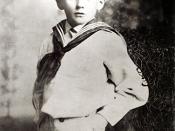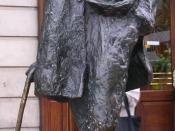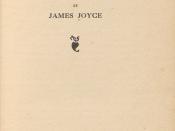Comparison of "The Boarding House" and "Araby" James Joyce wrote a collection of short stories that can be found published as Dubliners. An observant reader may notice a trend throughout these stories. They are stories of frustration and escape from the harsh realities that the characters are bound in. "Araby" details a boy's first crush portraying youth and childhood. "The Boarding House" portrays marriage and love as a social convention and a trap. The innocent enthusiasm of "Araby" cannot be found in the "The Boarding House", where the innocent Mr. Doran is manipulated into marriage. The two stories share the themes of frustration and escape. Both of the stories also share a setting in the Irish city of Dublin, Joyce's place of birth.
Through examining the plot of both stories a reader can see the frustration the characters are faced with. An unknown narrator tells "Araby" in the first person point of view.
The narrator is a young boy who finds himself infatuated with his friend's sisters. During their first conversation she asks if he is going to Araby, a bazaar in town with an Arabic theme. The boy, enamored with his loves words replies yes. When the narrator learns that she cannot go to Araby he promises to bring her back a gift, hoping to win her affection. In order to make his way to the bazaar he must receive money from his uncle, however the day of the bazaar his uncle soon forgets and returns home late. We can sense the narrator's frustration building as he waits in fear that he will not be able to fulfill his romantic notions, and will not be able to attend the bazaar. When the narrator arrives at the bazaar he finds that most of the booths have been closed and he does not have enough money to buy something for his love. Any nice gift is well beyond the narrator's price range. We know, from the description of the boy's housing situation and the small sum his uncle gives him, that their financial situation is tight. Though his anticipation of the event has provided him with pleasant daydreams, reality is much harsher. He remains a prisoner of his humble means and his city. This leaves the narrator frustrated and angry. He is also faced with the reality that even though he is at an exotic bazaar, he is still in Dublin. The accents of the vendors reinforce this, its just a show, there is no escape from the society he is in. His dreams are shattered.
"The Boarding House" follows the same theme of frustration and escape. Mrs. Mooney is a butcher's daughter who is forced to become independent because of a delinquent husband. She opens a boarding house where her tenants are tourists, artists, and clerks. She allows her daughter to have the run of the house and eventually she becomes involved in an affair with one of the tenants. Mrs. Mooney binds her time until she approaches her daughter about the situation. After her daughter confirms the rumors Mrs. Mooney plans to force Mr. Doran to marry her daughter. She knows that he will not risk losing his job because of this and she intends to bully him into the marriage. Love is not a consideration. Mrs. Mooney is only concerned with a social arrangement that will benefit her daughter. Mr. Doran is left powerless and frustrated because of his situation. He wants to remain a bachelor and feels that once he marries his life will be over.
However he faces many other social pressures, his job, his reputation, and Catholic guilt over the affair. This all leads to his feelings of entrapment. He is living in a boarding house, so this leads us to believe that he is not from an upper class. He is faced with many circumstances. However, unlike the narrator in "Araby", Mr. Doran's imprisonment is inflicted by another character, Mrs. Mooney.
Both stories illustrate the frustrations and social pressures in Dublin at the time in which James was writing. Whether it is poverty, social pressures, family situations or other characters, something is entrapping Joyce's characters. It is interesting to note that Joyce wrote both these stories, as well as most of the stories in Dubliners while in Europe. Once he left Dublin he rarely returned. The titles of both these stories are symbolic of where the characters realize their entrapment, at Araby and at the boarding house.





![[Portrait of Joe Mooney, Gaeton (Gate) Frega, and Andy Fitzgerald, Eddie Condon's, New York, N.Y., ca. June 1947] (LOC)](https://s.writework.com/uploads/11/116326/portrait-joe-mooney-gaeton-gate-frega-and-andy-fitzgerald-e-thumb.jpg)